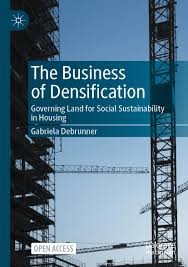
| Judul | The Business of Densification : Governing Land for Social Sustainability in Housing / Gabriela Debrunner |
| Pengarang | Debrunner, Gabriela |
| EDISI | - |
| Penerbitan | Switzerland : Palgrave Macmillan, 2024 |
| Deskripsi Fisik | 303p. :ill. |
| ISBN | 978-3-031-49014-9 |
| Subjek | CITY PLANNING SUSTAINABLE URBAN DEVELOPMENT |
| Catatan | Affordable housing shortage and social exclusion have become severe societal problems across the globe. Increasing numbers of people are suffering from social eviction and displacement due to urban densification, modernization, rising rents, and intense housing commodification. Vulnerable resident groups – such as old-aged or households with children – who often live in old housing stocks planned to be densified, renovated, or upgraded with higher rents, are forced to leave the urban core centers because they can no longer afford to live in central locations, or because they experience unstable or insecure housing conditions. A scenario that is highly unsustainable. So far, studies on densification have mainly considered the process as technological, architectural, or design-based problem (e.g., Kyttä et al., 2013; Broitman & Koomen, 2015; Bibby et al., 2018). However, systematic knowledge on how to implement densification objectives sustainably – regarding economic, environmental, and social aspects – is sti |
| Bentuk Karya | Tidak ada kode yang sesuai |
| Target Pembaca | Tidak ada kode yang sesuai |
| Lokasi Akses Online |
https://www.springernature.com/gp/products/books https://oer.unair.ac.id/files/original/f4115c973dd32ea7a78bac32e2619804.pdf |
| No Barcode | No. Panggil | Akses | Lokasi | Ketersediaan |
|---|---|---|---|---|
| 290925192 | 301 Deb b | Baca Online | Perpustakaan Pusat - Online Resources Ebook |
Tersedia |
| Tag | Ind1 | Ind2 | Isi |
| 001 | INLIS000000000161307 | ||
| 005 | 20250505104310 | ||
| 007 | ta | ||
| 008 | 250505################|##########|#|## | ||
| 020 | # | # | $a 978-3-031-49014-9 |
| 035 | # | # | $a 0010-0525000079 |
| 082 | # | # | $a 301 |
| 084 | # | # | $a 301 Deb b |
| 100 | 1 | # | $a Debrunner, Gabriela |
| 245 | 1 | # | $a The Business of Densification : $b Governing Land for Social Sustainability in Housing /$c Gabriela Debrunner |
| 250 | # | # | $a - |
| 260 | # | # | $a Switzerland :$b Palgrave Macmillan,$c 2024 |
| 300 | # | # | $a 303p. : $b ill. |
| 505 | # | # | $a Affordable housing shortage and social exclusion have become severe societal problems across the globe. Increasing numbers of people are suffering from social eviction and displacement due to urban densification, modernization, rising rents, and intense housing commodification. Vulnerable resident groups – such as old-aged or households with children – who often live in old housing stocks planned to be densified, renovated, or upgraded with higher rents, are forced to leave the urban core centers because they can no longer afford to live in central locations, or because they experience unstable or insecure housing conditions. A scenario that is highly unsustainable. So far, studies on densification have mainly considered the process as technological, architectural, or design-based problem (e.g., Kyttä et al., 2013; Broitman & Koomen, 2015; Bibby et al., 2018). However, systematic knowledge on how to implement densification objectives sustainably – regarding economic, environmental, and social aspects – is still lacking. This book tackles this gap by analyzing densification from a governance perspective. Its point of departure is that densification per se does not necessarily lead to sustainable outcomes in terms of social inclusion, cohesion, or community stability. Rather, it politicizes densification by neglecting how the process is planned, implemented, and governed by the actors involved. The book applies an actors-centered neoinstitutionalist political ecology approach to reveal the specific objectives and strategies of actors involved, as well as the socio-political structures (i.e. rules. laws, and policies) that govern densification. Four Swiss in-depth empirical qualitative case studies (Zürich, Basel, Köniz, and Kloten) illustrate the political and legal conditions for success or failure for (un)sustainable implementations of densification. Ultimately, this book advises stakeholders, governments, urban practitioners, and academics on more effective, community-oriented, collective, and decommodified forms of governance to respond to the needs of the public at large rather than simply catering to private individuals and firms. Such governance initiatives entail active municipal land policy approaches outside a purely market-based investment logic that not only limit, but also work with property rights. This is an open access book. |
| 650 | # | # | $a CITY PLANNING |
| 650 | # | # | $a SUSTAINABLE URBAN DEVELOPMENT |
| 856 | # | # | $a https://oer.unair.ac.id/files/original/f4115c973dd32ea7a78bac32e2619804.pdf |
| 856 | # | # | $a https://www.springernature.com/gp/products/books |
| 990 | # | # | $a 290925192 |
Content Unduh katalog
Karya Terkait :